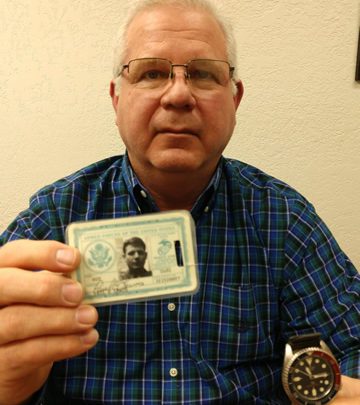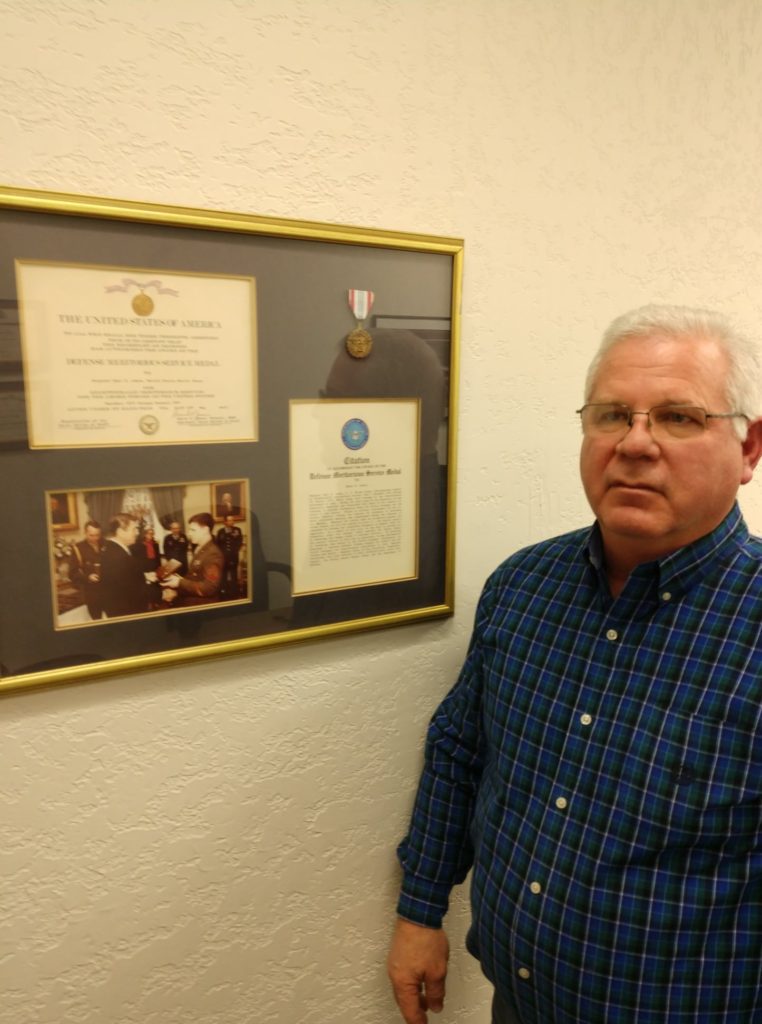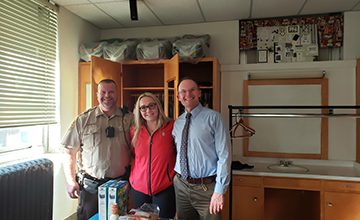Paul Lewis talks about release from Iran Hostage Crisis 38 years later

By FRED KRONER
fred@mahometnews.com
Sunday was just another day for Sidney resident Paul Lewis.
No parties. No parades.
“I hung around the house,” he said.
Exactly 38 years earlier, on Jan. 20, 1981, there was reason for Lewis and an entire country to celebrate.
The longest hostage crisis situation in recorded history ended when 52 Americans captives were released in Iran.
They had been held for 444 days by a group of Iranian college students who took control of the U.S. Embassy, in Tehran.
Minutes after Ronald Reagan was sworn in as President on that January morning, replacing Jimmy Carter, Homer High School graduate Lewis and 51 others were granted their freedom.
They were the subject of newspaper headlines nationally and locally.
***
Decades later, Lewis still vividly remembers the final steps he took at the Tehran airport on the fateful day of his release.
“At the top of the runway, I saw Arabs with machine guns,” Lewis said. “An Algerian said in perfect English, ‘Once you cross this step, you’re safe,’
“I hesitated when I saw the Arabs with machine guns.”
He continued the march, onward to a waiting plane that transported all 52 of the former hostages.
The first stop was Athens, Greece, for refueling.
Some news reports were inaccurate, Lewis said.
“They said we sat on the runway for days,” Lewis said. “We didn’t. The plane did.
“We sat about 40 minutes, until the inauguration was over.”
Once in the air, there wasn’t an immediate sense of relief.
“We didn’t lose the tension until they announced we were in Turkish airspace,” Lewis, now 61, said.
Four months after his release, Lewis ended his military career. He had been in the Marines for five years and three months.
***
In the weeks preceding the release, Lewis said he had “an inkling,” something was in the works.
“Around the first of December (1980), they moved us to like a Hyatt, except there were bars on the windows,” Lewis said. “Each room had a bathroom. We even had hot water a couple of times.
“They gave us a physical. They gave us back shoes and we got to watch the previous year’s Super Bowl,” he added.
He then learned the captors wanted something in return, something Lewis wasn’t willing to offer.
“They brought us in and wanted us to say we’d been well-treated,” he recalled. “I said, the first four weeks you guys beat the shit out of me, then we were warehoused, and the last month has been OK.’ ”
He weighed 190 pounds when he arrived in Iran and left at about 170.
“I ate everything they gave us,” he said. “They fed us a lot of protein, turkey and chicken.”
Even though the signs seemed promising as 1980 gave way to 1981, Lewis wasn’t getting his hopes too high.
“We’d been through letdowns before when we were still there when we thought it would be over,” he said.
***
Lewis joined the Marine Corps in February, 1976, nine months after graduating from high school.
He received a $2,500 signing bonus.
“I had three uncles in the Marine Corps,” Lewis said.”They were bigger than life to me. That became my goal.”
Twenty months later, he was a sergeant.
“By the time I left (Camp Pendleton, in California), I was 20 and a platoon sergeant responsible for 64 people,” Lewis said.
He was stationed in Budapest for 13 months, and then was transferred to Iran “to be a watch-stander at the Embassy,” he said. “It was manned 24 hours a day.”
Lewis’ first impression of the Iran facility wasn’t favorable.
“It was a 27-acre compound and there were 14 Marines,” he recalled. “I said, ‘You can’t protect this place.’
“You could have had a regimen and couldn’t protect the place.”
His flight into Tehran had arrived on Nov. 3, 1979.
Fourteen hours later — before he had even started his first work shift — the facility was under siege.
Lewis didn’t feel good about being right. It wasn’t adequately protected.
The 40th anniversary of their capture will be on Nov. 4, 2019.
***
His instructions for his first full day were to arrive at work at noon.
“I was tired and didn’t set an alarm,” Lewis said. “At 10 a.m., someone knocked the door open and said we were under attack.
“I dumped a feed sack to get a uniform. I didn’t grab an ID or a passport.”
Reality quickly set in.
“I’m the newest guy, but I’m the senior sergeant, so I’m in charge,” Lewis said. “I got on the radio and called in.
“They said help was on the way.”
Lewis was dubious.
“The guys who were supposed to be guarding us were smoking cigarettes with the guys attacking us,” he said.
No one was coming to get them that day.
“The government had no one to help us,” Lewis said.
***
In all, 66 Americans were captured. Within two weeks, 13 were released. Another one, seriously ill, was released in July 1980.
Lewis wasn’t one of the fortunate ones.
“They had a roster of the Embassy, and I wasn’t on it,” he said. “They thought I was a CIA agent.
“They took my watch apart, and put it back together. They tried to take the soles off my shoes.
What I feared most was getting shot accidentally.”
Even if he were inclined to be helpful, he was in a no-win position.
“I had nothing to give them,” Lewis said, “even if they started cutting my fingers off.”
There was no language barrier.
“The people who interrogated me spoke English,” he said.
He was held in isolation for more than a month.
“I was by myself the first 40 days and had handcuffs on 45 days,” he said. “As far as torture, no, but we got poked and knocked around.
“I had both of my shoulders separated.”
***
Iran wasn’t even Lewis’ original destination as his 13-month stint in Budapest was ending.
“I had orders to go to Rome,” he said, “but I didn’t want to go.
“Big posts are impersonable. I thought I would take a six-month tour in Iran.”
As a sergeant, he was making $600 a month, plus a modest bonus.
“Twelve dollars for overseas pay,” he said.
Lewis was the only Marine from Budapest assigned to Iran in November, 1979.
“The guy who left (Bob Mendez) had just left (Iran) days earlier,” Lewis said. “I called him about three months ago.
“He’s in Hong Kong now. I said, ‘I’ve been looking for you for 38 years. I wanted to kick your butt.’ “
***
As he sat alone in captivity, Lewis found himself depressed, and that was just a month into the ordeal.
“I was thinking I could spend six, seven, eight years here,” he said.
The hostages were moved multiple times.
“My room was a closet some of the time,” he said.
To help cope, he said, “I started exercising an hour and a half a day.”
By the time of his release, Lewis said, “I was doing three two-hour workouts a day.”
There were adjustments he felt forced to make.
“My boots were stolen one night while I was sleeping,” he said. “I slept with my trousers on and only took them off to wash them out in the sink.
“The whole time there, I had two pair of underwear. The elastic was pretty well shot.”
***
Lewis, who is Catholic, recalls his first Christmas in captivity.
“I was looking forward to Christmas,” he said.
The hostages were blind-folded and led into a room.
“We were always blind-folded when we left a room, and usually shackled,” Lewis said.
The blinders were removed and, Lewis said, “we could see a table with food. There was an Iranian between each of us.
“They asked us to hold hands and pray.
“I wouldn’t do that.”
When they were returned to their quarters, he said, “they strip-searched us.”
***
For the longest time, Lewis was housed with a Marine from Texas, John McKell.
“We were two Marines stuck in the same thing together,” Lewis said. “We became close friends.
“There were times to be afraid, like when we faced a mock firing squad. Getting ready to die takes a lot out of you when you don’t.”
The Marines concluded they had no reasonable options.
“It didn’t make any sense to attack the guards who came in the room,” Lewis said, “because you weren’t going anywhere (if an escape from the room was successful).
“We figured we were more valuable alive than dead.”
Concerns for their safety were always on their minds.
“They’d come in with guns pointed and yelling about once a month,” Lewis said. “I can’t say we weren’t frightened.
“It wouldn’t have taken much for that to go bad.”
***
About a year ago, Lewis started writing a book about his experience. It’s not done, but he said he intends to finish it.
He’s more willing to discuss the situation now than when he was first released.
“I had requests to appear (and speak) for money,” he said. “I burned them.”
There were some obligations he couldn’t get out of that easily.
“My mom had green mail bags full of mail from people wanting autographs,” he said. “She’d have me sign those for hours and hours and hours.”
The transition back to civilian life wasn’t easy.
“It was worse than I thought,” Lewis said. “Everyone knew who we were for a while.”
He wasn’t anxious for a parade in his honor upon returning to his parents’ Champaign County home.
“I rejected the hero thing,” Lewis said. “There was nothing heroic about it.”
The parade, however, took place and Illinois Governor James Thompson was one of the attendees.
***
Not everyone agreed with Lewis’ sentiments about not being a hero.
In a White House ceremony, he met President Reagan and received a the Defense Meritorious Service Award .

Defense Meritorious Service Award from President Reagan after his release from the Iran Hostage Crisis.
He also received the money he was owed, but nothing more.
“We didn’t get hazardous duty pay (for the days in Iran),” Lewis said.
Major league baseball commissioner Bowie Kuhn issued a gold card lifetime pass to each of the returning hostages. The passes guaranteed admittance to any regular-season game at the major or minor league level.
“I only used it once,” Lewis said. “I buy my own tickets.”
***
Lewis has had a personal mantra since returning to Illinois. It helps him deal with stressful situations.
“No matter how bad things get,” he said, “it has been worse and I can get through it.”
He and his wife, Kristi, have two children, Nate 33, and Nicholas, 30.
Before starting his active duty, Lewis had attended Eureka College to play football. He left after one quarter, playing as a safety in a scrimmage before suffering a knee injury.
He subsequently enrolled at the University of Illinois, earning a bachelor’s degree in agriculture economics in 1985. He owns and operates Lewis Wealth Management Group, in Champaign.
He started with his uncle, Bill, and, in 1988, went on his own.
It’s time, he said, to start working on his Bucket List.
“There are cities and places in the U.S. I’d like to visit,” he said. “I haven’t seen the Grand Canyon, except on a plane.”
If he had the chance to re-do one decision in his life, Lewis doesn’t need to think long about what it would be.
“I would have gone to Rome,” he said, referring to an offer he bypassed before he was sent to Iran.





